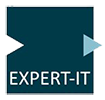- English
- Français
AI integration
A Structured Approach to Integrating AI into the Enterprise
The integration of artificial intelligence into an enterprise should not be carried out in isolation, but as part of an overall vision of digital transformation. To guarantee effective and measurable deployment, Expert-IT proposes a methodology based on rigorous enterprise modelling, drawing on recognised frameworks such as TOGAF, ArchiMate, BPMN and UML.
This approach enables us to map the organisation by identifying the business processes, data flows and interactions between the various entities. Based on this analysis, we define strategic objectives and select the most relevant departments to start the AI integration project.
The assessment of results is based on clear performance indicators (KPIs), enabling actions to be adjusted on an ongoing basis and demonstrating the added value of AI for operational efficiency.
We call this approach the AI Transformation Framework (AITF).
Enterprise AI Integration Process - AI Transformation Framework (AITF)
TheAITF is a structured process for identifying, planning and deploying AI solutions tailored to a company's specific needs. It is based on 5 main stages:
1. Enterprise Modelling and Process Mapping.
📌 Objective: Understand what already exists in order to identify AI opportunities.
- Gathering business and technological requirements.
- Mapping business processes with BPMN and data flows with ArchiMate.
- Definition of interactions between players and IT systems.
- Identification of friction points and opportunities for optimisation with AI.
2. Definition of Transformation Objectives and Selection of Priority Areas.
📌 Objective: Target the departments and processes most conducive to AI.
- Prioritisation of AI use cases (automation, data analysis, AI assistants, etc.).
- Selection of pilot departments (HR, finance, customer support, production, etc.).
- Assessment of technical and regulatory constraints.
- Validation of objectives with stakeholders.
3. Design and development of AI Solutions
📌 Objective: Deploy prototypes and validate their impact.
- Development of targeted AI Proof of Concept (PoC).
- Integration with existing databases and systems.
- Testing LLM models for data analysis and process automation.
- Validation with business teams before wider deployment.
4. Progressive deployment and monitoring of performance indicators.
📌 Objective: Measure impact and adjust solutions.
- Production deployment on selected processes.
- Monitoring of transformation KPIs (reduction in processing time, improved decisions, ROI, user satisfaction).
- Collecting user feedback to refine the AI models.
- Training teams in the use of new AI solutions.
5. Extending and generalising AI to the Enterprise.
📌 Objective: Industrialise AI across the entire organisation.
- Evaluation of the results obtained and identification of the necessary adjustments.
- Extension of AI solutions to other departments.
- Integration into the overall digital transformation strategy.
- Setting up an AI centre of excellence to support continuous innovation.
Why choose the AI Transformation Framework (AITF)?
✅ S tructured and progressive approach for controlled AI integration.
✅ Based on recognised standards (TOGAF, ArchiMate, BPMN, UML) ensuring a clear vision of the business.
✅ Monitoring of KPIs to measure impact and adjust AI strategies.
✅ Flexibility and adaptability according to the size and digital maturity of the organisation.
Valorisation of data and optimisation of processes to improve performance.
TheAI Transformation Framework is designed to ensure that AI becomes a genuine performance lever and not just a fad.
🚀 Want to integrate AI into your business with a structured approach? Contact Expert-IT today!
Expert-IT, your ICT partner
At Expert-IT SA, we combine know-how and experience to bring your IT projects to the success.
Let's discuss your project
Contact us
- + 32 (0) 10 49 51 00
- info@expert-it.com
